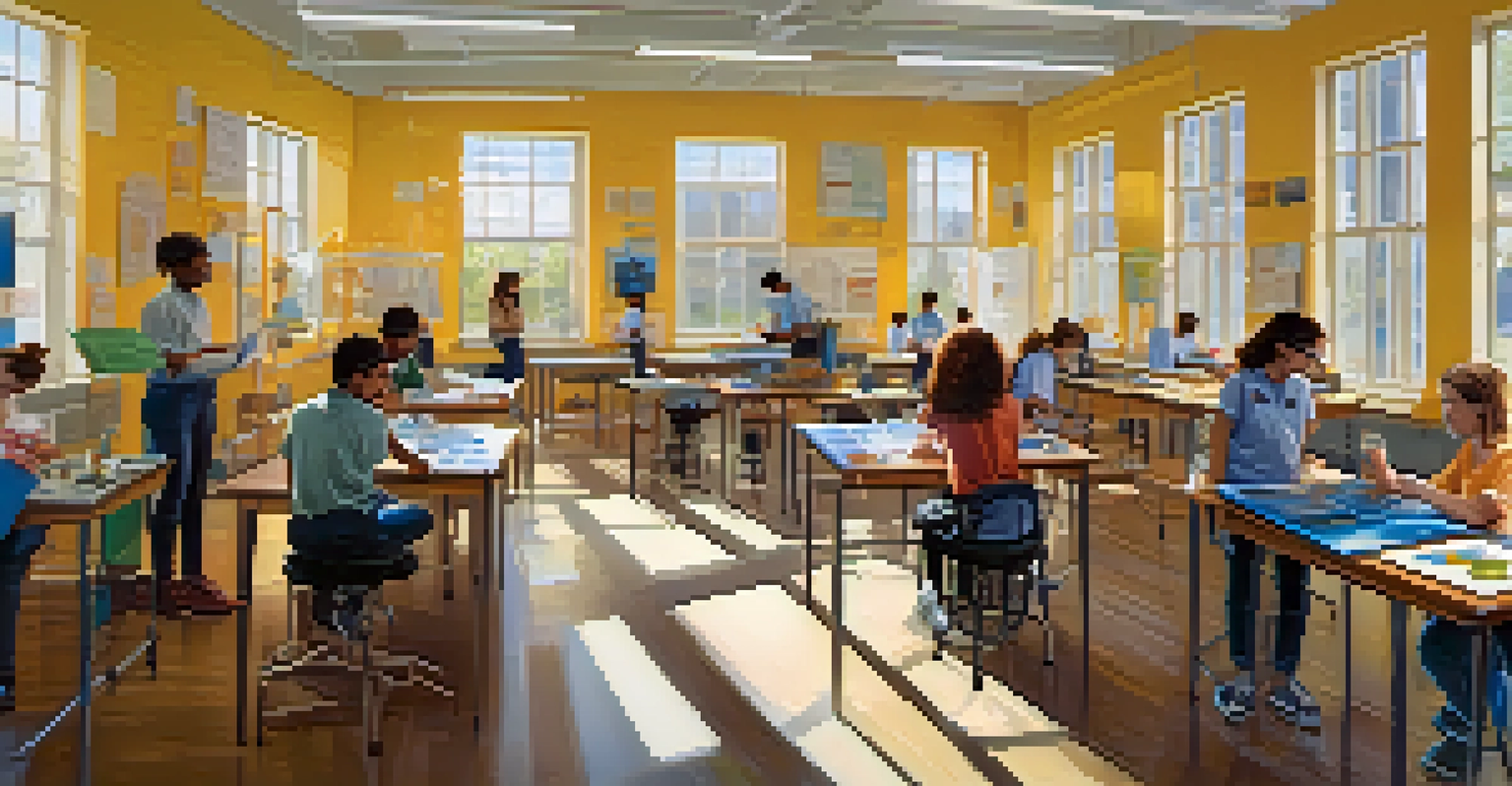Rochester's Economic Future: Challenges and Opportunities

Understanding Rochester's Economic Landscape Today
Rochester, New York, has a rich history marked by innovation and industry, particularly in manufacturing and education. As we look toward the future, it's essential to understand the current economic landscape, shaped by both historical legacies and modern challenges. Factors such as population decline and shifts in job markets have created a unique set of circumstances that require careful navigation.
Innovation distinguishes between a leader and a follower.
Despite these hurdles, Rochester also boasts a strong educational foundation with institutions like the University of Rochester and Rochester Institute of Technology. This educational prowess fosters a skilled workforce, which is vital for attracting new businesses and retaining existing ones. By leveraging this talent pool, Rochester can establish itself as a hub for innovation and technology.
Additionally, the city's strategic location near major highways and the Great Lakes makes it an attractive destination for logistics and distribution companies. With the right investments in infrastructure and community development, Rochester can transform its economic narrative into one of resilience and growth.
Key Challenges Impacting Rochester's Economic Growth
One of the primary challenges Rochester faces is population decline, which can lead to a shrinking workforce and reduced consumer spending. As younger generations leave for opportunities in larger cities, the city must find ways to attract and retain talent. This includes creating a vibrant cultural scene, affordable housing, and job opportunities that appeal to millennials and Gen Z.

Another significant hurdle is the need for economic diversification. Historically reliant on manufacturing, Rochester must innovate beyond traditional sectors to remain competitive. This means investing in emerging industries such as technology, healthcare, and renewable energy, which can provide new job opportunities and stimulate economic growth.
Rochester's Economic Challenges
The city faces significant hurdles, including population decline and the need for economic diversification, to sustain growth.
Lastly, infrastructure issues, including transportation and public services, pose challenges for businesses and residents alike. Addressing these concerns is critical for improving quality of life and creating an environment conducive to business growth. A focus on modernization and sustainability can help Rochester overcome these obstacles.
Harnessing the Power of Innovation and Technology
Innovation is at the heart of Rochester's potential economic revival. The city has a history of technological advancement, from the camera industry to modern medical devices. By fostering a culture of innovation through partnerships between local businesses and educational institutions, Rochester can position itself as a leader in tech-driven industries.
The best way to predict the future is to create it.
Startups and tech companies are increasingly drawn to regions with supportive ecosystems, including access to funding, mentorship, and networking opportunities. By creating incubators and accelerators, Rochester can nurture local entrepreneurs and attract outside investment. This not only creates jobs but also encourages a spirit of collaboration within the community.
Moreover, technology can enhance traditional industries in Rochester, making them more efficient and competitive. For instance, integrating automation and data analytics into manufacturing processes can lead to higher productivity and lower costs. Embracing these advancements will be crucial for the city's economic future.
The Role of Education in Shaping the Workforce
Education plays a pivotal role in shaping Rochester's workforce and, by extension, its economic future. With several prestigious universities in the area, there is a wealth of knowledge and talent that can be harnessed for local industries. By aligning educational curricula with the needs of local employers, Rochester can ensure that graduates are equipped with the skills necessary for the jobs of tomorrow.
Moreover, partnerships between schools and businesses can provide students with real-world experience through internships and co-op programs. This not only benefits students but also helps businesses cultivate a pipeline of qualified candidates. Engaging the next generation early on can foster a sense of community and commitment to Rochester's growth.
Innovation and Education Drive Growth
Rochester's strong educational foundation and focus on innovation are key to attracting new businesses and fostering a skilled workforce.
Additionally, adult education and retraining programs are essential for those looking to transition into new career paths. As industries evolve, providing ongoing education opportunities can help workers remain competitive and adaptable in the job market.
Community Engagement: A Catalyst for Economic Development
Community engagement is vital for fostering a strong economic environment in Rochester. When residents are actively involved in local decision-making, it can lead to initiatives that directly address their needs and aspirations. This grassroots approach ensures that economic development strategies are inclusive and reflective of the community's values.
Local organizations and initiatives can play a significant role in promoting civic engagement. By hosting forums and discussions, residents can voice their concerns and contribute ideas for improvement. This not only helps build a sense of community but also empowers individuals to take ownership of Rochester's future.
Furthermore, collaboration among various stakeholders—including government, businesses, and non-profits—can magnify the impact of community efforts. By working together, these groups can create comprehensive strategies that stimulate economic growth while enhancing the quality of life for all residents.
The Importance of Sustainable Economic Practices
Sustainability is becoming an increasingly important factor in economic development, and Rochester has the opportunity to lead the way. By prioritizing sustainable practices, the city can attract environmentally conscious businesses and residents. This includes investing in green infrastructure, promoting renewable energy, and encouraging sustainable transportation options.
Furthermore, sustainability can enhance the quality of life for residents. Green spaces, clean air, and reduced pollution not only make the city more appealing but also promote public health and well-being. By integrating sustainability into economic planning, Rochester can ensure that growth does not come at the expense of the environment.
Community Engagement is Essential
Active community involvement in decision-making can lead to inclusive economic development strategies that reflect local values.
As global awareness of climate change rises, consumers are more likely to support businesses that prioritize sustainability. Rochester can capitalize on this trend by promoting its commitment to eco-friendly practices, thereby attracting a new demographic of residents and businesses that share these values.
Looking Ahead: A Vision for Rochester's Economic Future
As we look ahead, the vision for Rochester's economic future should be rooted in resilience, innovation, and community collaboration. Embracing change while honoring its rich history will be key to navigating the challenges that lie ahead. By focusing on education, technology, and sustainability, Rochester can carve out a unique niche in the competitive economic landscape.
It's essential for local leaders to foster an inclusive environment where all voices are heard, ensuring that economic growth benefits everyone in the community. This means creating policies that support small businesses, promote equitable job opportunities, and invest in community services.

Ultimately, Rochester's economic future depends on the collective efforts of its residents, businesses, and government. By working together and embracing a shared vision, the city can overcome its challenges and seize the opportunities that lie ahead, paving the way for a thriving and vibrant community.